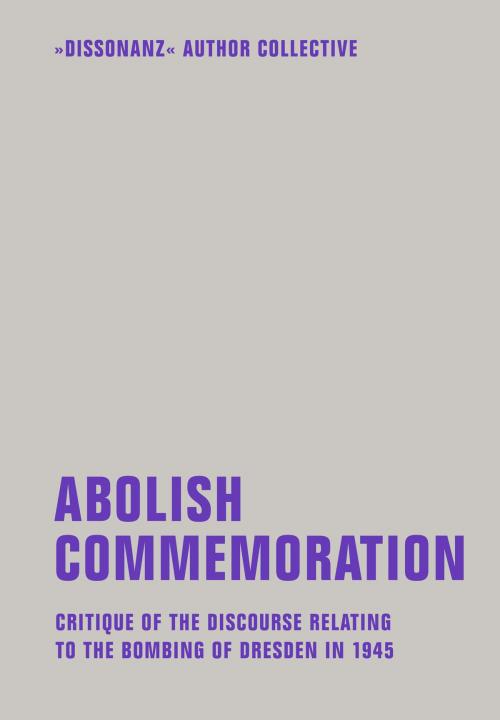Abolish Commemoration
Critique of the discourse relating to the bombing of Dresden in 1945
Nonfiction, Social & Cultural Studies, Political Science, Social Science| Author: | ISBN: | 9783957321053 | |
| Publisher: | Verbrecher Verlag | Publication: | February 6, 2015 |
| Imprint: | Language: | English |
| Author: | |
| ISBN: | 9783957321053 |
| Publisher: | Verbrecher Verlag |
| Publication: | February 6, 2015 |
| Imprint: | |
| Language: | English |
While German tourists visiting Dresden are no longer quite as shocked by the old buildings they see everywhere, they do still irritate tourists from abroad. Everything around the Frauenkirche [Church of Our Lady] smells of renovation and Disneyland so one is made aware of the reconstruction. However, at the very latest, questions start to arise on the way to Pillnitz, via the villa quarter Blasewitz and the 'Blaue Wunder' [Blue Wonder] Bridge. How could all of this have survived the firestorm? After all, it was a second Hiroshima, wasn't it? Dresden is legend - a beautiful, innocent city of art and culture - and the German victimisation narrative without peer, bombed unnecessarily shortly before the end of the war with hundreds of thousands dead. It is a lie of 'Allied war crimes' with a rain of phosphorus and low-flying fighters targeting the civilian population. The Allied air raids of 13 to 15 February 1945 are a fixed point of reference in Dresden's memorial culture. Over the decades they have provided its climax and, at any given time, an expression of the prevailing politics of history. The texts in this e-book afford an overview of the substantive contents of, and the developments in, Dresden's remembrance policies as well as furnishing a fundamental critique of current memorial politics of both the city and Germany as a whole. Dresden presents an image of itself as a symbol of peace and reconciliation and, in the meantime, also as a symbol for 'accurate memorialisation' as opposed to the historically revisionist version of the Nazis. The annual neo-Nazi marches have played no small part in provoking a re-assessment of some of the legends leading to facts being researched and the Nazi history of Dresden described and defined. Is this enough? Shouldn't the commemoration itself be abolished?
While German tourists visiting Dresden are no longer quite as shocked by the old buildings they see everywhere, they do still irritate tourists from abroad. Everything around the Frauenkirche [Church of Our Lady] smells of renovation and Disneyland so one is made aware of the reconstruction. However, at the very latest, questions start to arise on the way to Pillnitz, via the villa quarter Blasewitz and the 'Blaue Wunder' [Blue Wonder] Bridge. How could all of this have survived the firestorm? After all, it was a second Hiroshima, wasn't it? Dresden is legend - a beautiful, innocent city of art and culture - and the German victimisation narrative without peer, bombed unnecessarily shortly before the end of the war with hundreds of thousands dead. It is a lie of 'Allied war crimes' with a rain of phosphorus and low-flying fighters targeting the civilian population. The Allied air raids of 13 to 15 February 1945 are a fixed point of reference in Dresden's memorial culture. Over the decades they have provided its climax and, at any given time, an expression of the prevailing politics of history. The texts in this e-book afford an overview of the substantive contents of, and the developments in, Dresden's remembrance policies as well as furnishing a fundamental critique of current memorial politics of both the city and Germany as a whole. Dresden presents an image of itself as a symbol of peace and reconciliation and, in the meantime, also as a symbol for 'accurate memorialisation' as opposed to the historically revisionist version of the Nazis. The annual neo-Nazi marches have played no small part in provoking a re-assessment of some of the legends leading to facts being researched and the Nazi history of Dresden described and defined. Is this enough? Shouldn't the commemoration itself be abolished?















